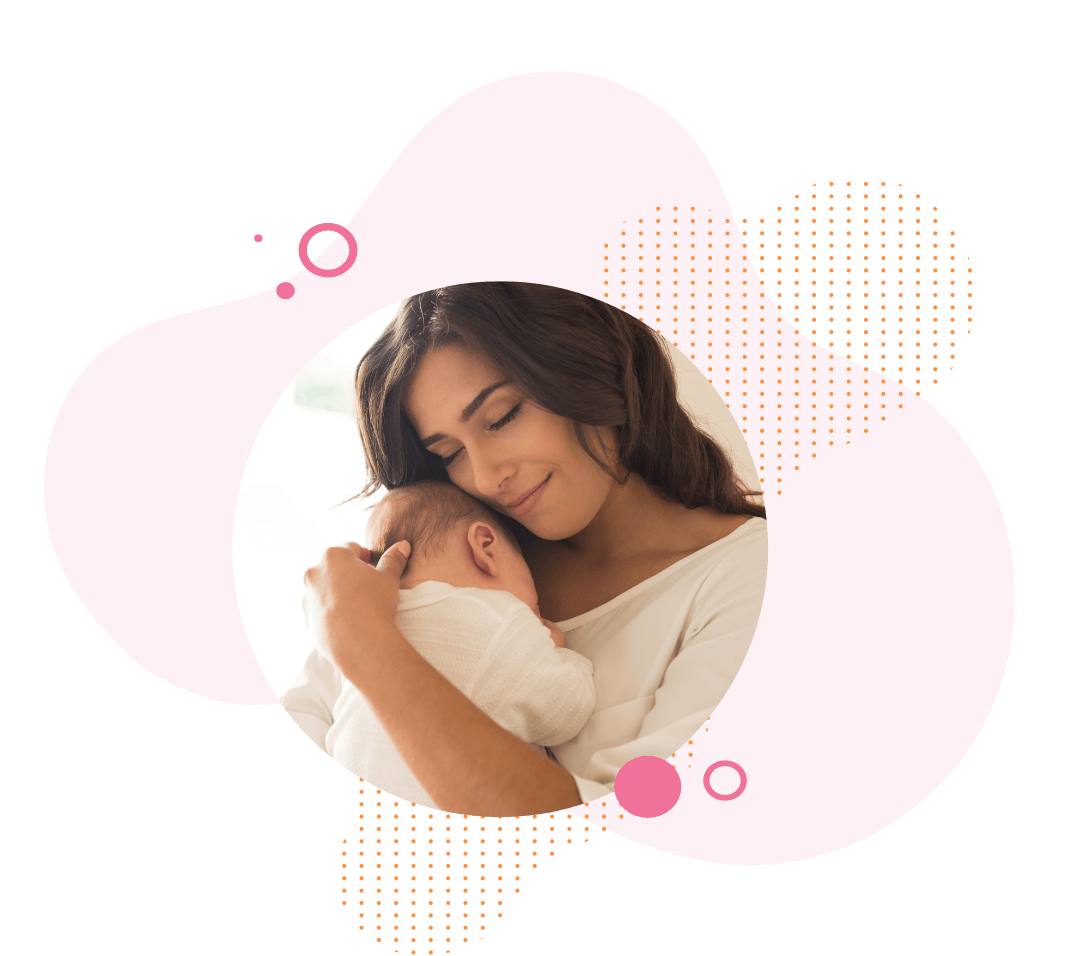New Mother
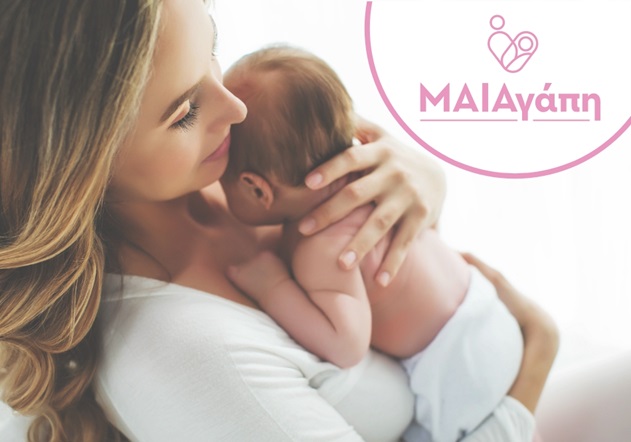
The postpartum period begins immediately after childbirth and the delivery of the placenta, and lasts for up to 42 days after labor.
In this time, the mother’s body experiences various physical and emotional changes.
What can happen to my body?
Postpartum pain
They are referred to as afterpains and are caused by oxytocin release.
Oxytocin is the hormone which stimulates contractions during labor. After birth, oxytocin continues to be produced, leading to the reduction in the volume of the uterus through contractions, helping it to shrink back to its pre-pregnancy size.
After the delivery of the placenta, the uterus weighs 1kg on average.
In approximately 6 weeks, it will be 95% lighter.
Breastfeeding helps the uterus shrink back faster to its pre-pregnancy size, since a higher quantity of oxytocin is released.
Lochia
It is the blood from the wound created when the placenta is detached from the uterus.
In the first few days after delivery, the blood has a deep red color and the flow may be heavy.
As the days go by, the blood flow decreases, changes color from red to pinkish or brownish and then to yellowish, until eventually the discharge is colorless.
During this period, it is best to use pads, which you will need to change frequently, and avoid tampons, since they can increase the risk of infection.
Attention if you
- Experience heavy blood loss for 4 or more days.
- Observe plenty of excreted blood clots
- Notice foul smelling vaginal discharge
- Feel faint, or experience shortness of breath or dizziness
Dysouria
It is very likely to experience decreased urine output or feel the need to urinate but cannot.
Drink plenty of fluids and walk as much as possible to help your bladder function.
Bowel function
Postpartum bowel movements (especially after a C-section) are a cause of concern. If you feel pain or swelling in the area around the anus, you may have hemorrhoids.
A hot bath will help, as well as placing an icepack in the area. You may consult your doctor for using a hemorrhoid ointment.
If you have sutures in the area, do not be afraid they may break if you exert pressure. Although the first few times may be painful, do not worry. The sutures will not be affected and soon you will be back on track.
Early intervention is advised in the case of a C-section.
Tips
Adding natural fibers, vegetables, cereals and fruit to your diet may help.
Back pain
Back pain is very common after labor and lasts for a while. During pregnancy, due to the developing embryo and the shifting of your center of gravity, the spine is strained and back pain may appear. The presence of relaxin makes the ligaments and joints more relaxed and sensitive. The prolonged and exhausting labor is one more burdening factor.
Tips
Commencing exercises may relieve you. Consult your doctor about when to start exercising.
Menstruation
- For mothers who breastfeed, it may take several months to start menstruating. In some women, though, although they breastfeed, menstruation may return sooner. After contacting your doctor, you should use a birth control method to prevent an unwanted pregnancy.
- Mothers who do no breastfeed can expect menstruation to return from the 5th week to third month after labor.
Vaginal Pain
In the postpartum period, you may experience irritation and pain in the genitalia area.
If perineoplasty or perineal injury had preceded, the symptoms may last about a week. The extensive tears in the area may need more time to heal completely.
There is also a chance you may have some abrasions in the area of the urethra, which heal quickly. However, they may cause a burning sensation during urination.
To relieve the pain and help healing, it is important to:
- Wash and dry the area carefully to avoid infections.
- Rinse the sensitive area with lukewarm water during urination, to reduce the burning sensation caused by urine.
- Use an icepack or ice wrapped in a clean towel, to cool off the area and reduce any irritation.
Breasts
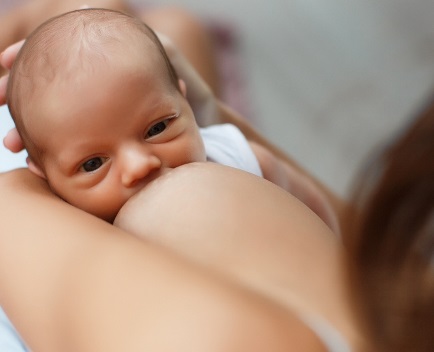
- During the 3rd-4th day after labor, the breasts are engorged, and become more sensitive and possibly painful.
- Frequent breastfeeding and wearing a bra to support the breasts will relieve you and make you more comfortable.
- Taking a hot shower before breastfeeding as well as using hot compresses will help.
- Hot water helps in enlarging the pores, makes milk flow easier and relieves the breasts.
Hair
However, after labor, the hormone levels return to the pre-pregnancy levels. This results in hair loss.
Hair loss is normal for most new mothers. It is not worrisome, but transient.
Tips
You may consult your doctor in case of prolonged hair loss.
Skin
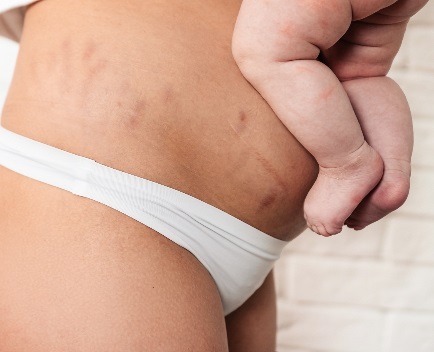
Spots on the skin, such as the linea nigra and chloasma which appear during pregnancy, will subside soon.
In these cases, you should avoid sun exposure to prevent the deterioration of dark spots.
Perspiration
Tips
Fluid consumption will help a lot.
After-birth suggestions
Visit to your doctor
During the visit, the vagina, cervix and uterus are checked to determine that everything is in the proper position.
If you had undergone a C-section, the incision line is checked. The doctor will also check your weight, blood pressure and breasts.
Healthy postpartum diet
You must continue to follow a balanced and healthy diet after pregnancy because it is important to regain a metabolic balance and boost your health. This is even more significant in the event that you breastfeed.
During breastfeeding, as in
pregnancy, energy needs increase by approximately 330-400 calories daily. For every 100ml of milk produced, 85 calories are approximately consumed. A baby gets about 750ml daily. Therefore, approximately 650 calories are required daily for milk production.
Out of these, 200-300 calories are covered by fat stored for this purpose. Therefore, breastfeeding increases the energy needs of new mothers by approximately 330 calories daily; a quantity, however, which may easily be covered with a balanced diet,
such as 1 serving of dairy products, 1 serving of cereals and 1 additional fruit per day.
The nutrition of the nursing mother does not require anything more than a balanced diet, which includes food from all the food groups.
Hydration needs also increase during breastfeeding. All beverages and several types of food may meet these needs: water, 100% fresh juices, milk, tea, coffee, beverages, soups, fruit and vegetables, yogurt.
Some types of food should be avoided or limited during breastfeeding, such as:
- Big fish (swordfish, shark). They may contain heavy metals, such as mercury. It is recommended to avoid big fish from oceans and choose smaller fish from the Mediterranean Sea.
- Alcohol. Ideally, no alcohol should be consumed. However, having one drink a day, provided it is consumed at least 2 hours prior to the next breastfeeding, is not known to be harmful to the infant.
- Coffee. Caffeine intake up to 250-300mg per day is considered safe. Apart from coffee, there is caffeine in sodas, chocolate, tea and energy drinks.
Tips
The pediatrician, the doctor and the midwife may provide specific instructions to new mothers about their nutrition so that it benefits their baby.
Activities / Working Out
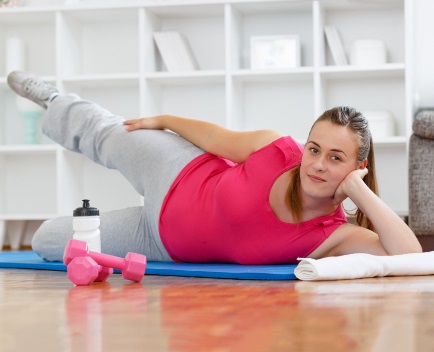
As for working out, they can start immediately after natural childbirth (even in a week), while they may start a month later after a C-section.
Every woman has her own pace and needs, and she can determine if and when she can fully return to her activities.
She needs to start with light exercises, which help in relaxing and improving circulation. They offer energy and help restore lost muscle.
The first exercises tighten the pelvic floor muscles (Kegel exercises), improve circulation, with attention to the lower limbs to avoid thromboses, as well as strengthen the abdominal and spinal muscles. The duration and frequency of workouts increase gradually.
Psychology
Postpartum emotional changes
When you feel well mentally, it is easier to manage stress and cherish your life with your baby.
Perinatal mental illness may develop in the period immediately after labor (postpartum period) and up to the first year of the child’s life. The postpartum period is when a woman tries to adjust to new conditions.
In this time, the mother’s body experiences various physical and emotional changes. Mental illnesses during the postpartum period are called postpartum mental disorders and the most common are: postpartum depression and anxiety disorders, while, rarely, postnatal psychosis may develop, which is a very serious disorder, as the woman loses touch with reality.
Conditions which cause severe or continuous anxiety before and after labor determine the development of perinatal mental illnesses.
These conditions include:
- An unexpected or difficult pregnancy.
- History of gynecological disorders or infertility.
- Fear of the pain during labor.
- A difficult labor.
- Low self-esteem.
- Breastfeeding difficulties.
- Pre-term labor or health problems of the infant or the mother.
- Lack of sleep for a long period of time.
- A "difficult" baby.
- Being a single mother.
- Financial troubles.
Baby Blues or Postpartum melancholia
In the first 4-5 days after delivery, many new mothers may feel extreme exhaustion, cry for no apparent reason, react strongly, and feel restlessness and anxiety as to whether they will be able to cope with their new role as mothers. Other symptoms of the baby blues or normal postpartum melancholia are bad mood, insomnia, irritability and impatience.
It is a very common transitional condition inflicted by hormonal changes. The symptoms appear for several minutes to a few hours; they subside gradually within 15 days after labor and disappear. If the symptoms last longer than fourteen days, are very intense and affect your everyday life, then it could be an indication of postpartum depression or anxiety disorder. In this case, you will need to seek help from an expert.
It is important not to panic, while, at the same time, you should share your feelings and ask for help and support from your partner, family and friends. It is a condition which subsides with the help, understanding and support of your surroundings.
Postpartum depression
Feelings of intense fear, anger and discouragement, which persist for weeks after childbirth, are not typical of melancholia.
These symptoms, which appear in 10-15% of new mothers, rarely subside without help. Obsessive ideas of guilt and inadequacy of the new mother regarding her parental role dominate.
In postpartum depression, intense craving for unhealthy food, mostly desserts and drinks, results in pathological overeating and weight gain.
New mothers report a strong desire to sleep; they sleep heavily, but wake up instantly to the sound of the newborn and are unable to fall back to sleep.
A special characteristic of depression is irritation with no reason, which leads to sobbing or violent outbursts.
Gradual improvement is expected within 6 months after childbirth
Ways to build mental strength
- Try to get rid of feelings of guilt and inadequacy. There is no such thing as a perfect parent or child. You will improve over time, as all mothers do.
- Follow a healthy diet; avoid alcohol and sugar.
- Take time to do what makes you smile.
- Try meditation or other relaxation techniques.
- Do not neglect your appearance.
- Try to go out.
- Share your experience with other mothers.
- Don’t do anything you don’t want to do or anything that agitates you.
- Share your feelings with your partner and do not shut them out of the emotions you are going through.





